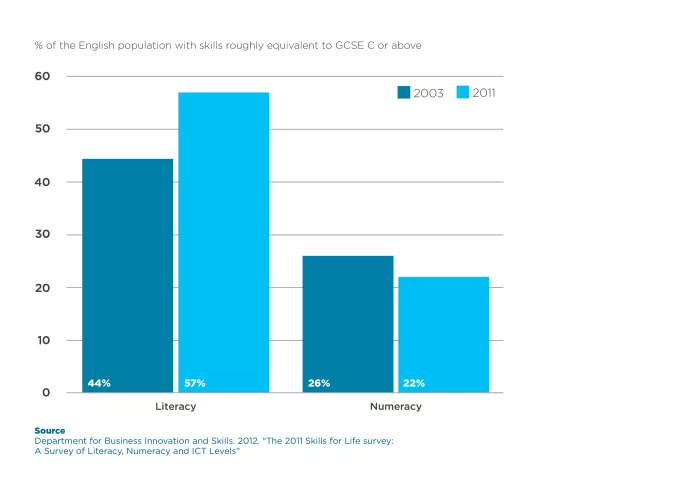
- Home
- Why maths needs its own Couch to 5K
Why maths needs its own Couch to 5K

It’s been 20 years since the former chief statistician, Lord Moser, produced the government-commissioned report A Fresh Start, which called for the levels of functional illiteracy and innumeracy to be halved within a decade.
In the following years, strong progress was made on literacy, but adult numeracy levels worsened. Although the numeracy data is hidden by those with a vested interest in doing so, the headline is stark: half of the working-age adult population (around 20 million people) have the everyday maths skills that we expect of primary school children, and three-quarters (around 30 million people) are below the level that we expect of 16-year-olds.

News: Poor maths skills cost the economy £388m per week
Listen: Maths recruitment, retention and resits
Background: Alternative maths GCSE resit curriculum to be tested
Disappointed but determined to do something about his main interest - numeracy - Lord Moser was instrumental in launching National Numeracy in 2012. The charity exists to enable everyone in the UK to become confident and competent with numbers and data so that they can make good decisions in their daily life. We believe that the confidence element is key. You will undoubtedly have heard adults say “I can’t do maths” almost as a badge of honour: no one says this about reading and writing, even if they do struggle.
A glaring gap in understanding among leaders
This week, we published a new body of evidence in our Building a numerate nation: confidence, belief and skills report, launched at the Bank of England. The report has two main elements: a survey of perceptions of the issue among MPs and business leaders, and then an analysis of data on the barriers to improving.
The headline of the perceptions survey is that business leaders underestimate the cost of poor numeracy by a factor of 50 (they gave an average estimate of £7 million per week versus the actual cost of £388 million per week - as calculated by Pro Bono Economics). In comparison, MPs were remarkably accurate (£213 million average estimate).
As we say in the first line of the report, to begin to solve a problem you need to understand where you are starting from - and there is a glaring gap in understanding among business leaders that we would argue relates directly to the productivity puzzle.
The good news from the survey is that once the scale and cost of the issue are understood, 90 per cent of both business leaders and MPs agreed that there needs to be a renewed focus on adult numeracy. But the key thing is what form that renewed focus takes; how do we learn from the lessons of past failure and build a numerate nation successfully this time around?
‘I can’t do maths...yet’
To answer this, we analysed the data from more than 50,000 people who have taken our National Numeracy Challenge and cross-mapped this against a YouGov survey of a representative sample of the UK population. We found that the factor that most closely correlated with numeracy score was confidence with numbers, and the factor that most closely correlated with people improving was having a growth mindset - so enabling people to at least shift from “I can’t do maths” to “I can’t do maths yet”. There is a lot more in the report but the two other things to flag here are that confidence is lowest among those who have most recently left the education system and that confidence is consistently lower on average among women than men across the age range.
We believe that to address these issues, the system needs fundamental change. We recently gathered evidence from within a Department for Education-funded Flexible Learning Fund project that showed adults can be reached and encouraged to engage with flexible online learning in a different way to formal courses. We managed to persuade over 20,000 adults who had not planned to improve their everyday maths to do so by using an approach that focused on building confidence alongside skills.
We think that the best parallel to guide us in combatting the innumeracy issue in the UK is not literacy, but instead the battle to combat obesity. Here, positivity and confidence has been at the heart of inspirational campaigns such as This Girl Can and the Couch to 5K app, and we have the nascent parallels of both in place already.
In the report, we are therefore calling on:
-
Policymakers to initiate something similar to the outstanding This Girl Can.
-
Business leaders to recognise this issue and enable their staff to work towards getting the Essentials of Numeracy - and perhaps support National Numeracy Day on 13 May 2020.
-
Everyone to think about being good with numbers, not as something genetic but instead as something akin to fitness - everyone can improve but it does take work to do so.
And if you want to get started, here is the link to the National Numeracy Challenge, where you can do so for free, in your own time and in confidence.
Mike Ellicock is the CEO of National Numeracy
Register with Tes and you can read five free articles every month, plus you'll have access to our range of award-winning newsletters.
Keep reading for just £4.90 per month
You've reached your limit of free articles this month. Subscribe for £4.90 per month for three months and get:
- Unlimited access to all Tes magazine content
- Exclusive subscriber-only stories
- Award-winning email newsletters
You've reached your limit of free articles this month. Subscribe for £4.90 per month for three months and get:
- Unlimited access to all Tes magazine content
- Exclusive subscriber-only stories
- Award-winning email newsletters
